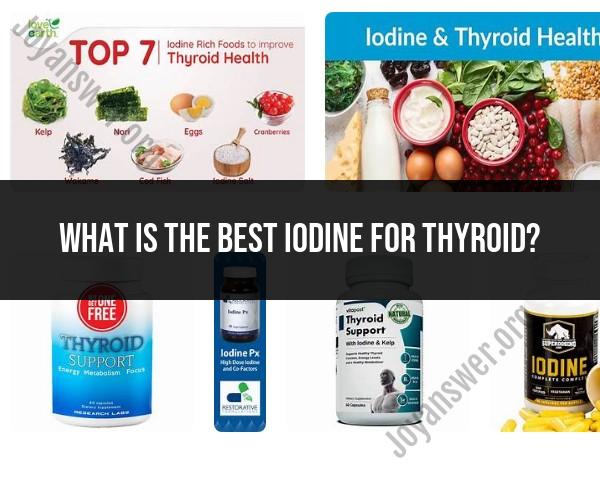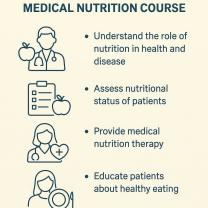What is the best iodine for thyroid?
When considering iodine supplementation for thyroid health, it's essential to do so under the guidance of a healthcare professional, especially if you suspect an iodine deficiency or thyroid-related issues. The "best" iodine for thyroid health varies from person to person, depending on their specific needs and circumstances. Here are some key points to consider:
Consult a Healthcare Professional: Before starting any iodine supplementation, consult with a healthcare provider, such as an endocrinologist or primary care physician, who can assess your thyroid health through blood tests and determine whether iodine supplementation is necessary.
Dietary Sources: In many cases, obtaining iodine through dietary sources is sufficient. Iodine is naturally present in various foods, including iodized salt, seafood (such as fish and seaweed), and dairy products. Ensure your diet includes these iodine-rich foods.
Iodine Supplements: If you are advised to take iodine supplements, it's essential to choose the right type and dose under medical supervision. Common forms of iodine supplements include potassium iodide, potassium iodate, and nascent iodine. Your healthcare provider will recommend the appropriate form and dosage.
Avoid Excessive Iodine: Excessive iodine intake can be as problematic as iodine deficiency for thyroid health. High doses of iodine can lead to thyroid dysfunction, so it's crucial not to self-prescribe iodine supplements without professional guidance.
Natural vs. Synthetic Iodine: Some individuals prefer natural or organic iodine sources, such as kelp supplements, while others opt for synthetic forms. The choice may depend on personal preferences and individual health considerations.
Monitor Thyroid Function: Regularly monitor your thyroid function with your healthcare provider to ensure that your iodine supplementation, if recommended, is effective and safe.
Individualized Treatment: Thyroid conditions and iodine requirements vary among individuals. What works for one person may not be suitable for another. An individualized treatment plan tailored to your specific needs is crucial for optimal thyroid health.
Safety Considerations: Be aware of the potential risks and side effects associated with iodine supplementation, such as iodine-induced hyperthyroidism or hypothyroidism. Your healthcare provider can help you manage these risks.
Remember that iodine supplementation is generally recommended for individuals with diagnosed iodine deficiency or specific thyroid conditions. Overconsumption of iodine without medical guidance can lead to health issues. Therefore, it's important to consult a healthcare professional for proper evaluation and guidance in addressing your thyroid health concerns.
Choosing the Best Iodine Supplement for Thyroid Health
When choosing an iodine supplement for thyroid health, it is important to consider the following factors:
Type of iodine: There are two main types of iodine supplements: potassium iodide and sodium iodide. Both types are effective in providing iodine for thyroid function.
Form of iodine: Iodine supplements are available in a variety of forms, including tablets, capsules, liquid drops, and lozenges. The best form for you will depend on your personal preference.
Dosage: The recommended dosage of iodine for adults is 150 micrograms (mcg) per day. However, people with certain thyroid conditions may need to take higher doses.
Safety: Iodine supplements are generally safe for most people. However, it is important to talk to your doctor before taking an iodine supplement if you have any underlying health conditions, such as hyperthyroidism or Graves' disease.
The Role of Iodine in Thyroid Function
Iodine is an essential nutrient for the production of thyroid hormones. Thyroid hormones play a vital role in regulating metabolism, growth, and development. If you do not get enough iodine, you may develop a condition called iodine deficiency. Iodine deficiency can cause a variety of symptoms, including fatigue, weight gain, hair loss, and goiter (enlarged thyroid gland).
Types and Forms of Iodine Supplements
There are two main types of iodine supplements:
- Potassium iodide: Potassium iodide is the most common type of iodine supplement. It is available in tablets, capsules, and liquid drops.
- Sodium iodide: Sodium iodide is less common than potassium iodide. It is available in tablets and capsules.
Iodine supplements are also available in a variety of forms, including:
- Tablets: Tablets are the most common form of iodine supplement. They are easy to take and can be swallowed with water.
- Capsules: Capsules are another common form of iodine supplement. They are easy to take and can be swallowed with water.
- Liquid drops: Liquid drops are a good option for people who have difficulty swallowing tablets or capsules. They can be added to food or drink.
- Lozenges: Lozenges are a good option for people who want a slow-release form of iodine. They dissolve slowly in the mouth and release iodine over time.
Dosage Recommendations and Safety Considerations
The recommended dosage of iodine for adults is 150 micrograms (mcg) per day. However, people with certain thyroid conditions may need to take higher doses.
It is important to talk to your doctor before taking an iodine supplement if you have any underlying health conditions, such as hyperthyroidism or Graves' disease. Iodine can interact with certain medications, so it is important to tell your doctor about all the medications you are taking.
Consulting a Healthcare Professional for Thyroid Health
If you are concerned about your thyroid health, it is important to see a doctor. A doctor can test your thyroid function and determine if you are getting enough iodine. If you are not getting enough iodine, your doctor can recommend an appropriate iodine supplement.













